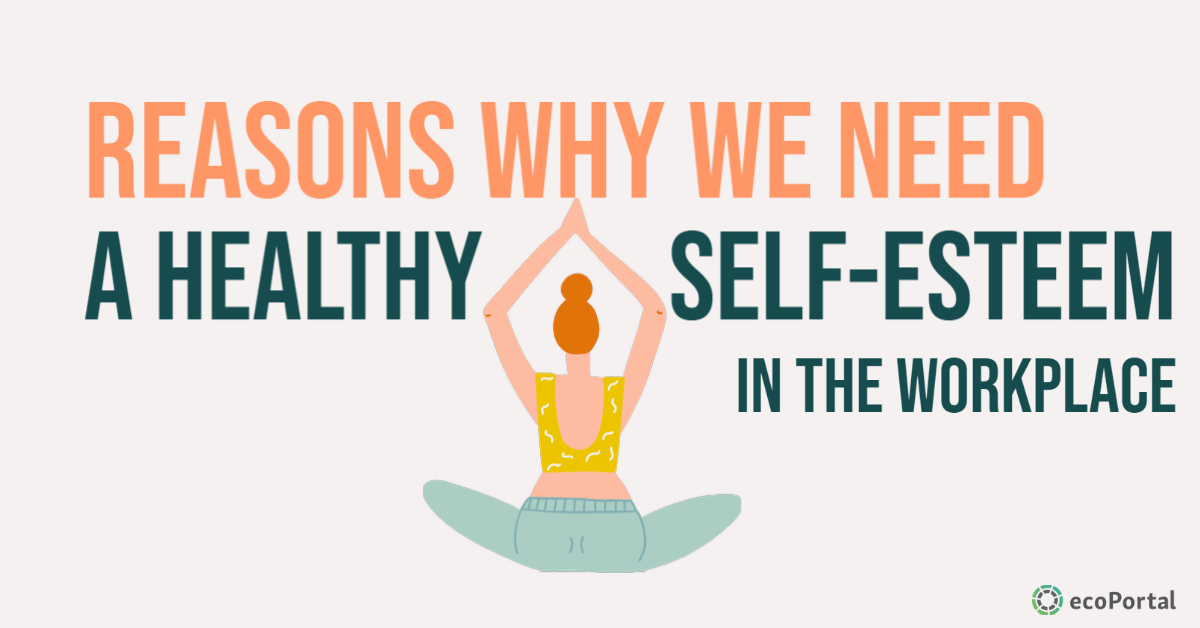We're living in a world where uncertainty reigns supreme. Things we took for granted - like our work environment - have changed quickly, moving towards a new normal. With the pandemic, we've had a shaky two years behind us, having to adapt quickly to vast changes in our daily lives. When our external environment is constantly changing and under threat, we can learn to keep our focus on things we can control, such as our internal environment, to keep trucking on.
What makes up our internal environment? This encompasses our motivations, what drives us and how we respond to challenges. Poor mental health can negatively affect our internal state and affect productivity, happiness, and a sense of hope.
One critical part of our internal state is the strength of our self-esteem. While the phrase ‘self-esteem’ might conjure up images of cheesy people doing yoga, or something your Year 2 teacher talked about while handing out gold stars, it actually does remain a critical pillar of mental health - the ultimate driving force that determines how we experience life. In a nutshell, self-esteem is how we perceive and value ourselves.
Get fresh H&S insights weekly
Countless studies have linked healthy self-esteem with reduced rates of depression and anxiety, as well as an essential tool in helping people heal from depression and anxiety. Self-esteem largely helps us to have better relationships, developmental resilience and nurtures our ability to learn from mistakes.
Confidence vs. Self-esteem
Confidence is a situational behaviour - where the old adage "Fake it until you make it" rings true. Confidence is a feeling that can come and go, depending on the situational context you're in. For example, based on perceived strengths and weaknesses, we might feel confident presenting a report to a team at work but shy away from cold calling a new client.
Self-esteem on the other hand doesn’t shift around so easily. Think of it like an unwavering bedrock, built slowly and a critical foundation for everything else we get up to in life. In simpler terms, self-esteem is our sense of intrinsic personal value or self-worth. Self-esteem doesn’t diminish easily in the face of adversity; rather, a mark of high self-esteem is the ability to retain a sense of worth despite adversity.
To illustrate, you might meet Joanna - a new software engineer - whose demeanour is charming and friendly. She puts up her hand in team meetings and doesn’t hesitate to introduce herself. Anyone could guess that she has high self-esteem, given her confident approach. However, when she can’t figure out a problem in her project, she transforms into a hideous monster (kidding, but she goes and cries in the bathroom). She becomes snarky and rude, and becomes jealous of her peers who can figure the problem out.
Cultivating unconditional self-esteem
Googling for advice regarding self-esteem in the workplace yields surprising results that might confuse a reader none the wiser to the difference between confidence and self-esteem.
Many articles tend to advise those wishing to build their self-esteem, to reflect on their accomplishments, skill sets and strengths as a measure of esteem. While reflection is a healthy mental exercise that can reveal much about yourself, in the case of self-esteem, this is not helpful advice.
Self-esteem, outlined earlier, is unwavering self-worth - in the face of anything. By equating our inherent value as a person to the sum of our achievements, we run the risk of developing conditional self-esteem.
The dangers of conditional self-esteem affect how we cope with failure. Let’s face it - unfortunately, life isn’t a predictable cycle of success, far from it. Rather, the way to success is through failure - which means we have to get uncomfortable with things going wrong.
If our self-worth is based solely on our black-and-white success stories, what happens if they run out? If your sense of worth and identity is based on the prestige of your job title, what happens if it goes away? 2020 was a crystal clear reminder of this and how life can change in an instant, thanks to circumstances beyond our control. Lockdown is an example of a situation where things change sharply, and we have to adapt to a new normal.
"IF OUR SELF-WORTH IS BASED SOLELY ON OUR BLACK-AND-WHITE SUCCESS STORIES, WHAT HAPPENS IF THEY RUN OUT?"
If our sense of self-esteem is based on our success, whenever we hit crisis mode, we baulk and our self-esteem comes crashing down, making it much harder to take the next steps towards a solution. Instead of dealing with failure, with a level head, failure becomes a catalyst for a downward spiral.
If we cultivate unconditional self-worth, we actually do ourselves a favour when failure stares us back in the face. Unconditional self-worth cultivates deeper resilience. When confronted with failure on the path to success, instead of baulking and crumbling, we take it on the chin, cheerfully learn from our mistakes and move forward.
At the end of the day, your successes, achievements, job titles and awards are all external factors. While they’re helpful for motivation and a sense of accomplishment, these factors shouldn't be the sole determinant of your self-esteem.
Instead, our self-esteem needs to be unconditional, a sense of deep value that exists, well, mostly because we exist - nothing more. Would you tell a small child that they are less valuable because they are yet to achieve external success?
Unconditional self-esteem helps you achieve success - not the other way around.

Where the workplace fits in
In the workplace, unconditional self-esteem is crucial for an agile, resilient workforce that can handle life, when life pelts us all with lemons.
Let’s face it, business isn’t always a walk in the park. Deadlines loom, clients can be fickle and our external environment often changes. Conflict can arise and challenge each person to learn to adapt to different perspectives and collaborate with people who think differently.
With strong self-esteem, several things happen that make these situations seamless.
We make peace with failure
We don’t crumble when things don’t work out - when a prospect uses up our time and resources but still doesn't sign your contract at the end. Or when a customer leaves a terrible review that's on Google for life. With healthy self-esteem, we can experience failure and still go on. We don't have to identify with the failure - e.g. "I'm a failure, I can't do anything right." Instead, we recognise that failure happens, learn the lessons we can from the situation, and move forward.
In the same vein, we can take constructive criticism better when we recognise our own worth. Our sense of personal intrinsic value isn’t tied up in whether our work is well-received or not, and so we can handle feedback and use it to learn and grow. To reiterate, self-esteem doesn’t mean you’ll never feel disappointed or nervous - it’s the recognition that situations that make you feel so don’t detract from your value.
We become better leaders
A strong sense of self-worth creates stronger leaders, who back their own decision-making. Would you rather be working for a leader who second-guesses themselves all the time, or someone who trusts their own thinking? With healthy self-esteem, a leader recognises their own ability to make sound decisions, and can confidently lead their team.
Furthermore, a leader who trusts their own decision-making is less likely to be a micromanager or engage in behaviours that become detrimental to the team around them. They trust that they've made the best hiring decisions with their team, and can extend their trust to their employees, giving them space to do their work effectively.
We contribute to a positive culture
People with high self-esteem make better colleagues and are largely more enjoyable to be around. They’re not jealous of others’ successes, but they celebrate and champion their team. Their identity isn’t threatened by others’ achievements, and they don't have to gossip about others or put people down to feel better about themselves.
Instead, they're supportive of those around them, and everyone is happy to work together for a common goal.
Final Words
It’s always important to emphasise the difference between confidence and true, unconditional self-esteem in your workplace. Healthy self-esteem is the cornerstone of mental health - an unwavering foundation that can help anyone through any challenge.
As a leader, you can model unconditional self-esteem each day. Actively acknowledge that your achievements aren’t the sole factor in your own worth. Embrace your own failures and talk about them, and how you learnt from them.
Remember that healthy self-esteem creates success - not the other way around.
Want to know more about how to create a better health and safety culture? View ecoPortal smarter safety videos. ecoPortal health and safety software can also help your business. Try a demo or get in touch with the team at ecoPortal.




.png?width=352&name=Copy%20of%20RETAIL%20SAFETY%20(2).png)

.jpg?width=352&name=AI%20health%20and%20safety-1%20(1).jpg)


